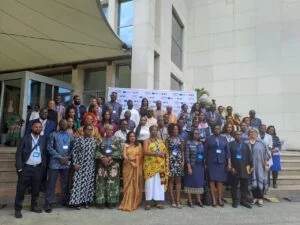
By Milcah Tanimu
The Foundation for Resilient Empowerment and Development (FRED), a non-governmental organization, has made an appeal for the expansion and sustained allocation of resources to fortify initiatives addressing gender-based violence throughout the nation.
During the visit by members of the Spotlight Initiative Africa Regional Programme (SIARP) Review and Learning Workshop to Speedmeals Culinary School, an UNDP Spotlight Initiative livelihood pathway program implemented by FRED, Mrs. Rosemary Echewe, Project Director of FRED, emphasized this point. She highlighted that these insights and recommendations stem from FRED’s involvement in implementing the Spotlight Initiative Project in Nigeria.
The Spotlight Initiative Project, a joint effort between the European Union and the United Nations, serves as the flagship undertaking aimed at eradicating all forms of violence against women and girls in Nigeria. It introduces a distinctive approach to address social protection interventions from a gender and human rights standpoint. Collaborating with various UN agencies, including UNDP Nigeria, the EU-UN Spotlight Initiative on Ending Violence against Women and Girls (EVAWGs) is actively underway to create a Nigeria where all women and girls, especially the most vulnerable, can live free from violence and harmful practices.
As the Spotlight Initiative program approaches its conclusion in December, Echewe conveyed that partners are committed to building upon the program’s achievements to reinforce advocacy and prevention efforts against gender-based violence in the country. She further noted that FRED, a project partner of the UNDP Spotlight Initiative, has implemented diverse programs to empower women for self-sustainability and support, particularly women living with disabilities, with the aim of reducing their susceptibility to gender-based violence.
The UNDP Spotlight Initiative livelihood pathway program includes provisions such as financial literacy, business registration, seed grants, and startup kits to empower beneficiaries ranging from individuals to small business owners. Echewe pointed out that since 2021, over 288 vulnerable women and girls who are survivors of gender-based violence have graduated from the UNDP-supported livelihood pathway integration program in Abuja and Lagos. These graduates were equipped with seed grants and startup kits to facilitate their new ventures, with training offered in fields like fashion design, culinary skills, hairdressing, shoe making, and baking.
Echewe called for an expansion of the budget allocated to gender projects to enable partners to reach more survivors, extend their efforts to additional states, and amplify the empowerment impact on survivors of gender-based violence. Beneficiaries are identified through government agencies like Women Affairs Poverty Alleviation (WAPA) Lagos State, Domestic and Sexual Violence Agency, and Lagos State Office for Disability Affairs (LASODA), among others.
One beneficiary, who introduced herself as ‘Blessing,’ shared that her participation in the 2021 training had empowered her as a fashion designer, enabling her to create clothes for people in Nigeria and abroad. She expressed self-reliance without depending on others. Similarly, another beneficiary, Shakira Ibrahim, stated that the program had diminished her vulnerabilities and enhanced her self-sufficiency through the acquisition of a livelihood.
Ms. Kori Habib, the Media Associate at the UN Population Fund (UNFPA) in Nigeria, commended the catalytic impact of the Spotlight Initiative project in bringing gender concerns to the forefront, supported by governmental endorsement. Habib acknowledged improvements in reporting and response, while underscoring the necessity for further interventions by partners, donors, and the government to bridge remaining gaps.
The Spotlight Initiative in Nigeria was launched in January 2019 with the objective of creating an environment where all women and girls, especially the most vulnerable, can lead lives free from violence and harmful practices. The SIARP program has developed a country-level sustainability strategy and established a strong foundation for sustainability by garnering support from the government and key stakeholders at all levels.
The Nigerian project is anchored on six pillars: laws and policies; institutions; prevention; services; data; CSOs (Civil Society Organizations); and the women’s movement.
